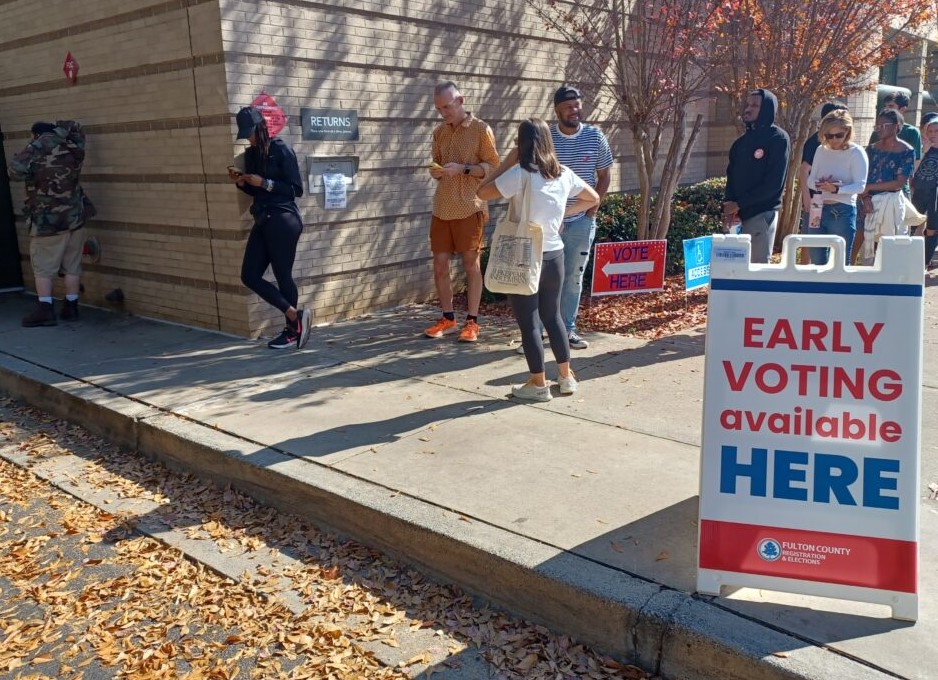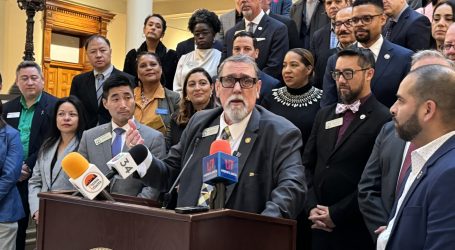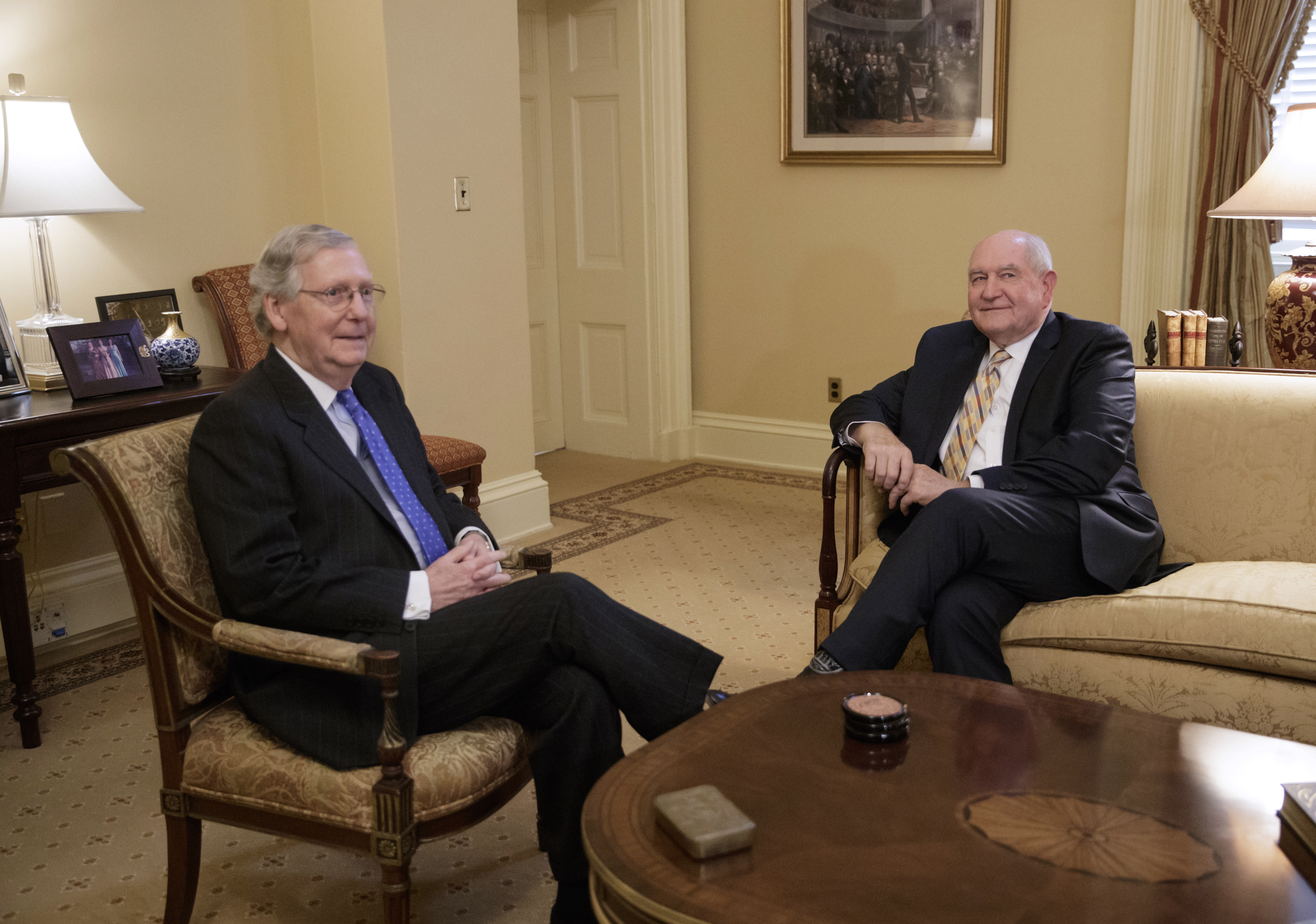State Senate panel presses ahead with bill that would ban ranked choice voting in Georgia

Georgia legislators in 2024 are taking up bills that would ban using instant runoffs for elections, remove the QR code used for paper ballots and give the State Election Board unilateral authority to investigate the secretary of state. (File during 2021 U.S. Senate runoff) John McCosh/Georgia Recorder
The Georgia Senate Ethics Committee advanced a bill Tuesday that would ban election officials in Georgia from adopting an instant runoff system that allows voters to rank candidates by preference to determine the outcome of elections.
The Senate Bill 355 measure passed the Senate panel by an 8-1 vote following hour-long testimony and debate on whether the state should take a preemptive strike banning a ranked choice voting method that’s becoming more common in municipal elections across the nation and is the way candidates are elected in states like Alaska.
Cataula Republican Sen. Randy Robertson sponsored the bill that limits ranked choice voting in Georgia to military members who have federal protections protecting their absentee voting rights. Robertson said he wants to prevent local or state election officials from adopting a new election process that he said can become confusing for voters and election administrators alike.
“If you’ve ever seen a ranked choice ballot, it looks like in some races like the lottery card that you pick at the Circle K with all the bubbles on it,” Robertson said.
Across the country, conservative leaders and organizations are trying to stave off a ranked choice election system they argue is being promoted by more left-leaning lobbyists and elected officials who say it saves taxpayers the burden of a separate runoff that attracts fewer voters to the polls. Since 2022, Florida and Tennessee are among a handful of states that have adopted statewide preemptive bans on ranked choice voting.
Democratic U.S. Sen. Raphael Warnock advocated for instant runoff elections in late 2022 as he campaigned for his upcoming Senate runoff against Republican Herschel Walker.
Georgia’s majority voting law has long required a candidate to get 50% of the vote or more in order to win their election and avoid a runoff.
In a ranked choice election, also known as an instant runoff, the candidate with the most votes does not necessarily win. Rather, the outcomes are determined by factoring the order that voters rank candidates until the winner has acquired enough votes to be declared the winner.
Instant runoffs piqued the interest of former Woodstock Republican Rep. Wes Cantrell after he was forced to enter a runoff primary in 2014 for his state legislative district.
Cantrell on Tuesday surmised that if his runoff ballot also did not draw interest for a Congressional runoff, the drop in voter turnout would’ve been much greater than the 21% decrease that occurred from the primary election.
Cantrell said that lawmakers should remain open to different ways to elect public officials.
“Runoffs result in voter fatigue, on average over 30% less people turn out for a runoff, and millions of taxpayer dollars are wasted on something that could have been easily avoided,” he said during Tuesday’s Senate Ethics Committee meeting.
America First Policy Institute’s Jordan Kittleson was among the opponents of ranked choice who testified on Tuesday. It is possible, he said, for candidates who significantly trail the top vote-getters in the first round to gain enough votes in much later rounds to win the election.
“It’s an attempt to disenfranchise voters and instead insert other winners who really, ultimately were losers initially in the first round” Kittleson said.
Former Utah county clerk Josh Daniels said that ranked choice voting was successfully conducted during local elections he oversaw in Utah.
“I think for your state you can understand that getting your voters in November to be the commanding decision on who wins a U.S. Senate race and not telling citizens they need to show up a month later to sort things out,” Daniels said. “That’s going to be more effective with broader participation and more buy in from your electorate as to who won the election.”
Cantrell said that if Georgia had allowed voters to select their candidate in order of preference in 2020, then Donald Trump likely wins Georgia by being the second preferred candidate among a large number of 62,000 votes cast for the Libertarian Party candidate. Trump lost in Georgia by nearly 12,000 votes to Democratic nominee Joe Biden.
“But let’s be clear, rank choice voting does not eliminate runoffs, it simply makes the runoff, if necessary, occur on the same night as the regular election,” Cantrell said.
Other legislation intended to change Georgia’s approach to elections include a bill to allow the State Election Board to investigate the secretary of state and to initiate other investigations into election matters.
GET THE MORNING HEADLINES DELIVERED TO YOUR INBOX
The post State Senate panel presses ahead with bill that would ban ranked choice voting in Georgia appeared first on Georgia Recorder.




